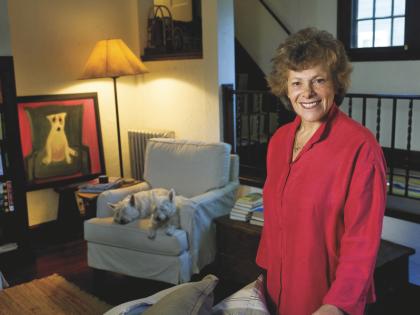Commencement speeches, according to cartoonist Garry Trudeau, "were invented largely in the belief that outgoing college students should never be released into the world until they have been properly sedated." Not always so, believes Peter J. Smith, editor of Onward! 25 Years of Advice, Exhortation, and Inspiration from America's Best Commencement Speeches (Scribner, $25). "The best of them bring out the best in everyone," Smith writes. "Commencement speeches are as personal as any formal speech delivered to 300 or more people can be. Few other kinds of speech possess their peculiar authenticity."
Although many of the 250 speeches Smith excerpts are by Harvardians, only two were given at Harvard, and one of those was a Class Day speech in 1977. (Writer George Plimpton '48 advised seniors to "stop now. Tell them you won't go. Go back to your rooms. Unpack!") The other one was by Czech president Václav Havel, LL.D. '95, in 1995. Although Smith has failed to do his homework on speeches given at Harvard, his sampler is at turns funny, touching, historically interesting, and wise.
Consider this reflection by politician Barbara Jordan, IOP '72, M.P.H. '76, LL.D. '77, at Middlebury College in 1987: "Think what a better world it would be if we all, the whole world, had cookies and milk about three o'clock every afternoon and then lay down on our blankets for a nap."
Writer John Updike '54, Litt.D. '92, at the University of Massachusetts at Amherst in 1993, pleaded, "Your generational savviness, it could be, in our age of imagery and sound bites, is a matter more of imagery than of the heft of real things, of earth and the tools that bit by bit move it. You cannot but learn more of the world's heft, as you take it now into your hands. Take it up reverently, for it is an old piece of clay, with millions of thumbprints on it."
Stem-winding injunction came from journalist Anthony Lewis '48, Nf '57, at Williams College in 1978: "Those of us who are not saints are bound to wonder, in the circumstances of this terrible century, what difference we can make. The belief that an individual can transform society is usually an illusion; newspaper columnists suffer from it, occasionally. But if wholesale transformation is unlikely, change does happen--and it usually comes because enough individuals refuse to live inside a compartment. Even in the overwhelmingly difficult circumstances of a South Africa, one person can make a difference. Do not turn your head away from injustice. Know the limitations of your country and yourself, but do not give up. Do not stop believing you can make a difference. Care!"
Frances Fitzgerald '62, writer, at Sarah Lawrence College in 1982, warned her young audience to "Watch out, watch out, as you go along, that what you're doing is not merely a job, not merely a career, but your work, the thing that you really want to do."
Shirley Chisholm, politician, at Mount Holyoke College in 1981, urged commencers to "Be as bold as the first man or woman to eat an oyster."
And columnist Ellen Goodman '63, Nf '74, at Smith College in 1993, said reassuringly: "This afternoon, I solemnly promise you that these have not been the best years of your life. The truth is that people who look back to college as the peak experience have had the dreariest of adulthoods. I don't wish that on any of you."







